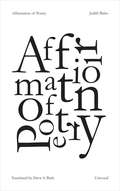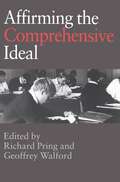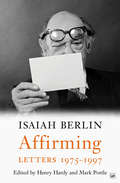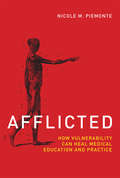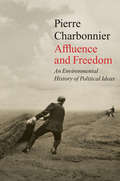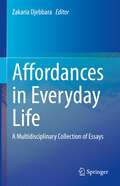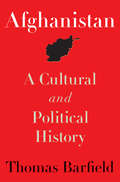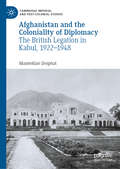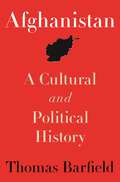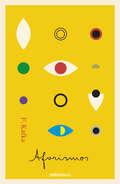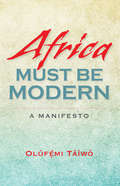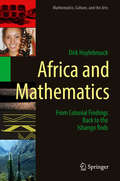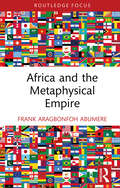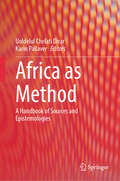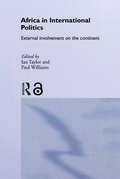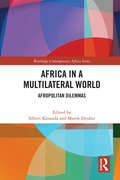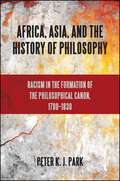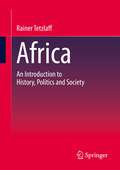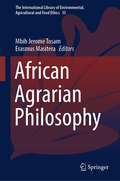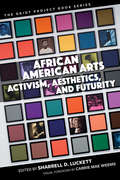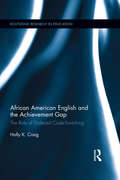- Table View
- List View
Affektivität und Sozialität: Phänomenologie und Soziologie des Affektiven
by Claudia Peter Marc Strotmann Moritz Von StettenAffekte bestimmen unser soziales Zusammenleben. In Form von Empfindungen, Stimmungen und Sensibilitäten sind sie Ausdruck unserer Berührbarkeit und Empfänglichkeit, sie schärfen unsere Aufmerksamkeit, lenken unsere Wahrnehmung oder treffen uns in unserer Verletzlichkeit. Über sie und mit ihnen erschließen wir uns selbst, andere und die Welt. Die affektiven Dimensionen des Sozialen sind infolge des affective turn Gegenstand neuerer interdisziplinärer Forschung. Anliegen des Buches ist es, das Potential der Phänomenologie innerhalb der Affektforschung anhand theoretischer und empirischer Fallstudien aufzuzeigen. Der Band versammelt Beiträge aus der Philosophie und Soziologie, die unter anderem an phänomenologische Ansätze von Husserl, Scheler, Merleau-Ponty, Patočka, Levinas, Waldenfels, Schmitz und Ratcliffe anknüpfen. Damit ermutigen die Texte des Bandes zu einem verstärkten Dialog zwischen philosophischer Reflexion und empirischer Sozialforschung.
Affirmation of Poetry (Univocal)
by Judith BalsoSince the times of Plato and Aristotle, the relation of poetry to philosophy has been controversial. For certain scholars, poetry should in no way be confused with philosophy. For others, poetry is at the heart of the possibility of thinking itself. In Affirmation of Poetry, Judith Balso defends the significance of poetry as a necessary practice for thinking. For Balso, if reading poetry properly has become an obscure task, poetry itself still carries with it a power of thinking: the efforts of the poets must continue. In analyzing the affirmation of thought found within the work of such poets as Osip Mandelstam, Wallace Stevens, Alberto Caeiro, and Giacomo Leopardi, Balso reestablishes poetry&’s place as a site of thought.
Affirming the Comprehensive Ideal
by Richard PringExamines the ideals which lay behind the development of comprehensive schools. Written by 14 British educationalists, this text considers the evidence and suggests how further progress might be made within the moral framework of secondary education for all, irrespective of background or ability. The text includes an afterword by the Rt Hon John Prescott, MP, Deputy Leader of the Labour Party.
Affirming: Letters 1975-1997
by Isaiah Berlin‘IB was one of the great affirmers of our time.’ John Banville, New York Review of BooksThe title of this final volume of Isaiah Berlin’s letters is echoed by John Banville’s verdict in his review of its predecessor, Building: Letters 1960–75, which saw Berlin publish some of his most important work, and create, in Oxford’s Wolfson College, an institutional and architectural legacy. In the period covered by this new volume (1975–97) he consolidates his intellectual legacy with a series of essay collections. These generate many requests for clarification from his readers, and stimulate him to reaffirm and sometimes refine his ideas, throwing substantive new light on his thought as he grapples with human issues of enduring importance.Berlin’s comments on world affairs, especially the continuing conflict between Israel and the Palestinians, and the collapse of Communism, are characteristically acute. This is also the era of the Northern Ireland Troubles, the Iranian revolution, the rise of Solidarity in Poland, the Chernobyl nuclear disaster, the fall of the Berlin Wall, Ayatollah Khomeini’s fatwa against Salman Rushdie, the spread of Islamic fundamentalism, and wars in the Falkland Islands, the Persian Gulf and the Balkans. Berlin scrutinises the leading politicians of the day, including Reagan, Thatcher and Gorbachev, and draws illuminating sketches of public figures, notably contrasting the personas of Alexander Solzhenitsyn and Andrey Sakharov. He declines a peerage, is awarded the Agnelli Prize for ethics, campaigns against philistine architecture in London and Jerusalem, helps run the National Gallery and Covent Garden, and talks at length to his biographer. He reflects on the ideas for which he is famous – especially liberty and pluralism – and there is a generous leavening of the conversational brilliance for which he is also renowned, as he corresponds with friends about politics, the academic world, music and musicians, art and artists, and writers and their work, always displaying a Shakespearean fascination with the variety of humankind.Affirming is the crowning achievement both of Berlin’s epistolary life and of the widely acclaimed edition of his letters whose first volume appeared in 2004.
Affizierungs- und Teilhabeprozesse zwischen Organismen und Maschinen (Technikzukünfte, Wissenschaft und Gesellschaft / Futures of Technology, Science and Society)
by Robert Stock Beate Ochsner Sybilla NikolowDer Band reflektiert Forschungspraktiken, die für das Projekt der Biokybernetik wie der aktuellen bionischen Prothetik und Medienökologie charakteristisch sind: die Suche nach einem dritten Weg zwischen Technologisierung des Bios und Biologisierung von Technik. Durch ihre möglichst dichten Beschreibungen der jeweiligen wechselseitigen Affizierungs- und Teilhabeprozesse zwischen Mensch und Technik tragen die wissenschaftshistorischen, philosophischen, kultur- und medienwissenschaftlichen Beiträge dazu bei, den Blick auf die bewusste Annäherung der Zwei Kulturen durch die gegenwärtigen Lebens- und Kulturwissenschaften zu erweitern. Dies wird u.a. durch die Kontextualisierung der Debatten in Bezug auf das Verhältnis zwischen Maschinen und Organismen sowie Artifiziellem und Natürlichem geleistet.
Afflicted: How Vulnerability Can Heal Medical Education and Practice (Basic Bioethics)
by Nicole M. PiemonteHow medical education and practice can move beyond a narrow focus on biological intervention to recognize the lived experiences of illness, suffering, and death.In Afflicted, Nicole Piemonte examines the preoccupation in medicine with cure over care, arguing that the traditional focus on biological intervention keeps medicine from addressing the complex realities of patient suffering. Although many have pointed to the lack of compassion and empathy in medical practice, few have considered the deeper philosophical, psychological, and ontological reasons for it. Piemonte fills that gap, examining why it is that clinicians and medical trainees largely evade issues of vulnerability and mortality and, doing so, offer patients compromised care. She argues that contemporary medical pedagogy and epistemology are not only shaped by the human tendency to flee from the reality of death and suffering but also perpetuate it. The root of the problem, she writes, is the educational and institutional culture that promotes reductionist understandings of care, illness, and suffering but avoids any authentic confrontation with human suffering and the fear and self-doubt that can come with that confrontation. Through a philosophical analysis of the patient-practitioner encounter, Piemonte argues that the doctor, in escaping from authentic engagement with a patient who is suffering, in fact “escapes from herself.”Piemonte explores the epistemology and pedagogy of medicine, examines its focus on calculative or technical thinking, and considers how “clinical detachment” diminishes physicians. She suggests ways that educators might cultivate the capacity for authentic patient care and proposes specific curricular changes to help students expand their moral imaginations.
Affluence and Freedom: An Environmental History of Political Ideas
by Pierre CharbonnierIn this pathbreaking book, Pierre Charbonnier opens up a new intellectual terrain: an environmental history of political ideas. His aim is not to locate the seeds of ecological thought in the history of political ideas as others have done, but rather to show that all political ideas, whether or not they endorse ecological ideals, are informed by a certain conception of our relationship to the Earth and to our environment. The fundamental political categories of modernity were founded on the idea that we could improve on nature, that we could exert a decisive victory over its excesses and claim unlimited access to earthly resources. In this way, modern thinkers imagined a political society of free individuals, equal and prosperous, alongside the development of industry geared towards progress and liberated from the Earth’s shackles. Yet this pact between democracy and growth has now been called into question by climate change and the environmental crisis. It is therefore our duty today to rethink political emancipation, bearing in mind that this can no longer draw on the prospect of infinite growth promised by industrial capitalism. Ecology must draw on the power harnessed by nineteenth-century socialism to respond to the massive impact of industrialization, but it must also rethink the imperative to offer protection to society by taking account of the solidarity of social groups and their conditions in a world transformed by climate change. This timely and original work of social and political theory will be of interest to a wide readership in politics, sociology, environmental studies and the social sciences and humanities generally.
Affordances in Everyday Life: A Multidisciplinary Collection of Essays
by Zakaria DjebbaraThe concept of affordances is being increasingly used in fields beyond ecological psychology to reveal previously unexplored interdisciplinary relationships. These fields include engineering, robotics, artificial intelligence, neuroscience, urban theory, architecture, computer science, and much more. As the concept is adapted for its relational meaning between an agent and the environment, or object, the meaning of the term has changed to fit the customs of the adapting field. This book maps the different shades of the term and brings insights into how it is operationalized by providing short accessible essays regardless of background. Each contribution addresses big questions around this topic such as the application of the concept on ongoing research, how to measure or identify affordances, as well as other reflective questions about the future of affordances in the field. The book is envisioned to be read by non-experts, students, and researchers from several disciplines, and fills the need for summarization across disciplines. As the many adaptations flourished from the same psychological concept, this book also aims to function as a catalyst and motivation for reinterpreting the concepts for new directions. Compared to existing books, this book aims not to span the vertical dimension of field by taking a deep dive into a niche-field—instead, this book aims to have a wide horizontal span highlighting a common concept shared by an increasing number of fields, namely affordances. As such, this book takes a different approach by attempting to summarize the different emerging applications and definitions of the concept, and make them accessible to non-experts, students, and researchers regardless of background and level.
Afghanistan
by Thomas BarfieldAfghanistan traces the historic struggles and the changing nature of political authority in this volatile region of the world, from the Mughal Empire in the sixteenth century to the Taliban resurgence today. Thomas Barfield introduces readers to the bewildering diversity of tribal and ethnic groups in Afghanistan, explaining what unites them as Afghans despite the regional, cultural, and political differences that divide them. He shows how governing these peoples was relatively easy when power was concentrated in a small dynastic elite, but how this delicate political order broke down in the nineteenth and twentieth centuries when Afghanistan's rulers mobilized rural militias to expel first the British and later the Soviets. Armed insurgency proved remarkably successful against the foreign occupiers, but it also undermined the Afghan government's authority and rendered the country ever more difficult to govern as time passed. Barfield vividly describes how Afghanistan's armed factions plunged the country into a civil war, giving rise to clerical rule by the Taliban and Afghanistan's isolation from the world. He examines why the American invasion in the wake of September 11 toppled the Taliban so quickly, and how this easy victory lulled the United States into falsely believing that a viable state could be built just as easily. Afghanistan is essential reading for anyone who wants to understand how a land conquered and ruled by foreign dynasties for more than a thousand years became the "graveyard of empires" for the British and Soviets, and what the United States must do to avoid a similar fate.
Afghanistan and the Coloniality of Diplomacy: The British Legation in Kabul, 1922–1948 (Cambridge Imperial and Post-Colonial Studies Series)
by Maximilian DrephalThis book offers an institutional history of the British Legation in Kabul, which was established in response to the independence of Afghanistan in 1919. It contextualises this diplomatic mission in the wider remit of Anglo-Afghan relations and diplomacy from the nineteenth to the twenty-first century, examining the networks of family and profession that established the institution’s colonial foundations and its connections across South Asia and the Indian Ocean. The study presents the British Legation as a late imperial institution, which materialised colonialism's governmental practices in the age of independence. Ultimately, it demonstrates the continuation of asymmetries forged in the Anglo-Afghan encounter and shows how these were transformed into instances of diplomatic inequality in the realm of international relations. Approaching diplomacy through the themes of performance, the body and architecture, and in the context of knowledge transfers, this work offers new perspectives on international relations through a cultural history of diplomacy.
Afghanistan: A Cultural and Political History
by Thomas BarfieldAfghanistan traces the historic struggles and the changing nature of political authority in this volatile region of the world, from the Mughal Empire in the sixteenth century to the Taliban resurgence today. Thomas Barfield introduces readers to the bewildering diversity of tribal and ethnic groups in Afghanistan, explaining what unites them as Afghans despite the regional, cultural, and political differences that divide them. He shows how governing these peoples was relatively easy when power was concentrated in a small dynastic elite, but how this delicate political order broke down in the nineteenth and twentieth centuries when Afghanistan's rulers mobilized rural militias to expel first the British and later the Soviets. Armed insurgency proved remarkably successful against the foreign occupiers, but it also undermined the Afghan government's authority and rendered the country ever more difficult to govern as time passed. Barfield vividly describes how Afghanistan's armed factions plunged the country into a civil war, giving rise to clerical rule by the Taliban and Afghanistan's isolation from the world. He examines why the American invasion in the wake of September 11 toppled the Taliban so quickly, and how this easy victory lulled the United States into falsely believing that a viable state could be built just as easily. Afghanistan is essential reading for anyone who wants to understand how a land conquered and ruled by foreign dynasties for more than a thousand years became the "graveyard of empires" for the British and Soviets, and what the United States must do to avoid a similar fate.
Afghanistan: A Cultural and Political History, Second Edition (Princeton Shorts Ser. #9)
by Thomas BarfieldA major history of Afghanistan and its changing political cultureAfghanistan traces the historic struggles and the changing nature of political authority in this volatile region of the world, from the Mughal Empire in the sixteenth century to the Taliban resurgence today. Thomas Barfield introduces readers to the bewildering diversity of tribal and ethnic groups in Afghanistan, explaining what unites them as Afghans despite the regional, cultural, and political differences that divide them. He shows how governing these peoples was relatively easy when power was concentrated in a small dynastic elite, but how this delicate political order broke down in the nineteenth and twentieth centuries when Afghanistan's rulers mobilized rural militias to expel first the British and later the Soviets. Armed insurgency proved remarkably successful against the foreign occupiers, but it also undermined the Afghan government's authority and rendered the country ever more difficult to govern as time passed. Barfield vividly describes how Afghanistan's armed factions plunged the country into a civil war, giving rise to clerical rule by the Taliban and Afghanistan's isolation from the world. He examines why the American invasion in the wake of September 11 toppled the Taliban so quickly, and how this easy victory lulled the United States into falsely believing that a viable state could be built just as easily.Afghanistan is essential reading for anyone who wants to understand how a land conquered and ruled by foreign dynasties for more than a thousand years became the "graveyard of empires" for the British and Soviets, and why the United States failed to avoid the same fate.
Aforismos
by Franz KafkaUna recopilación inédita que nos habla del hombre, de las dificultades del artista, de sus miedos más profundos y de la vigencia de sus lecciones. En los cuadernos en octavo y en los diarios de Franz Kafka existe una gran variedad de textos dispersos, pensamientos condensados que fueron designados por el mismo autor como aforismos o que han sido considerados como tales en las diferentes ediciones de la obra del autor y, sobre todo, en la edición crítica y canónica que la editorial S. Fischer viene publicando desde 1982 y que es la que recoge la biblioteca Kafka en DeBols!llo. Este volumen, editado por Ignacio Echevarría y Jordi Llovet, ofrece al lector un cuidado compendio de aforismos que incluye, además del «Legajo de los aforismos» (1918), una serie de textos espigados de los cuadernos y legajos póstumos (1916 a 1923) y de los diarios (1920-1921). Una recopilación inédita que nos habla del hombre, de las dificultades delartista, de sus miedos más profundos y de la vigencia de sus lecciones. Reseña:«Kafka comprendía que los viajes, el sexo y los libros son caminos que no llevan a ninguna parte, y que sin embargo son caminos por los que hay que internarse y perderse para volverse a encontrar o para encontrar algo.»Roberto Bolaño
Africa Must Be Modern
by Olúfemi TáíwòIn a forthright and uncompromising manner, Olúfémi Táíwò explores Africa's hostility toward modernity and how that hostility has impeded economic development and social and political transformation. What has to change for Africa to be able to respond to the challenges of modernity and globalization? Táíwò insists that Africa can renew itself only by fully engaging with democracy and capitalism and by mining its untapped intellectual resources. While many may not agree with Táíwò's positions, they will be unable to ignore what he says. This is a bold exhortation for Africa to come into the 21st century.
Africa and Mathematics: From Colonial Findings Back to the Ishango Rods (Mathematics, Culture, and the Arts)
by Dirk HuylebrouckThis volume on ethnomathematics in Central Africa fills a gap in the current literature, focusing on a region rarely explored by other publications. It highlights the discovery of the Ishango rod, which was found to be the oldest mathematical tool in humanity's history, thereby shifting the origin of mathematics to the heart of Africa, and explores the different scientific hypotheses that emerged as a result. While it contains some high-level mathematics, the non-mathematical reader can easily skip these portions and enjoy the book’s survey of African history, culture, and art.
Africa and the Metaphysical Empire (Routledge Studies in African Philosophy)
by Frank Aragbonfoh AbumereThis book investigates whether African cultures can appropriate some useful aspects of Western cultures, or whether doing so risks falling into the metaphysical empire and diluting African identity.Ngugi wa Thiong’o and Ndlovu-Gatsheni characterise the metaphysical empire as an intangible non-physical and non-geographical invasion of the mental universe of formerly colonised peoples. As mutual exclusivists, they argue that authentic decolonization necessitates a complete dissociation of the African and her culture from colonial heritage. However, cultural appropriationists such as Wole Soyinka, Chinua Achebe and Chimamanda Ngozi Adichie argue that the African adoption of colonial heritage such as the English language is in no way antithetical to decolonization. This book delves into the debate by exploring the strengths and weaknesses of cultural appropriationism and, on the other hand, testing the validity of mutual exclusivism. The book demonstrates that cultural appropriation without falling into the metaphysical empire is possible, but that this poses important questions about the nature of the decolonization project itself, and where it should start and stop. A more accommodative decolonization would recognize the relationship between cultural universals and particulars, whilst also creating room for cultural appropriation. Ultimately, the book argues that both cultural appropriationists and mutual exclusivists must simultaneously renounce absolutism. By being amenable to a fusion of horizons, discourse can move beyond the decolonization fallacy of arguing that things are always either/or.This original and important contribution to the metaphysical empire debate will be a seminal read for researchers across the fields of philosophy, political science, African studies, and Black studies.
Africa as Method: A Handbook of Sources and Epistemologies
by Karin Pallaver Uoldelul Chelati DirarThis methods handbook investigates the multiple sources and interdisciplinary methodologies employed by scholars working on Africa. It illuminates how scholars of Africa locate, select, interpret, and combine sources to reconstruct Africa’s past. Each contributor presents a specific typology of source or body of sources. Focusing on specific case studies, the chapters offer a broad overview of the methods and sources employed by historians, anthropologists, linguists, and related disciplines in the humanities and social sciences, working on Africa. The topics covered are diverse and include the significance of oral sources and how they relate to written sources; the perspectives provided by female writings on and from Africa; the relevance of Islamic court records for the study of Africa; the use of songs and poetry for the understanding of contemporary political protests; the employment of photographs and other visual sources for the study of the African past; how new sources or new interpretations of existing ones can provide different historical periodization; and finally, how biographies and autobiographies, including personal experiences with fieldwork in Africa, can contribute to shed light on Africa’s past. The book is a valuable resource for graduate students and academics interested in doing research on Africa. It provides a sweeping but rich understanding of the methodologies in the field of African studies, and for historians in general. Ultimately, this book contends that the specific methodologies developed for the study of Africa are relevant not only for the understanding of the continent itself, but can also contribute significantly to the historical method more widely.
Africa in International Politics: External Involvement on the Continent (Routledge Advances in International Relations and Global Politics)
by Paul Williams Ian TaylorLocating Africa on the global stage, this book examines and compares external involvement in the continent, exploring the foreign policies of major states and international organizations towards Africa. The contributors work within a political economy framework in order to study how these powers have attempted to stimulate democracy, peace and prosperity in the context of neo-liberal hegemony and ask whom these attempts have benefited and failed.
Africa in a Multilateral World: Afropolitan Dilemmas (Routledge Contemporary Africa)
by Albert KasandaThe book analyses how Africans and Africa relate to other parts of the multilateral world, and to the world in general, and how these relations stem from local, national and regional interactions in different parts of Africa, as well as Africa as a whole. The first part focuses on the assumptions that are necessary to understand the role of Africa on the global stage, especially from the perspectives of political philosophy and global and international studies. The second part of the book looks at both Afropolitan trends and the limits of Afropolitanism. In the third part the authors focus on specific African global tendencies stemming from the local conditions in several case studies. Traditional and modern politics is connected, problematically, with the current Jihadist organisations in the local African conditions related to unilateralism and global war on terror, for example. The fourth part deals with the relevance of the language ambivalence in relation to global interactions. It examines various views of African philosophy and lays bare the perception of earlier colonial languages in view of their current strength of global action. This book will be of interest to scholars of African studies, political philosophy, politics and global studies.
Africa, Asia, and the History of Philosophy: Racism in the Formation of the Philosophical Canon, 1780–1830 (SUNY series, Philosophy and Race)
by Peter K. ParkWinner of the 2016 Frantz Fanon Prize for Outstanding Book in Caribbean Thought presented by the Caribbean Philosophical AssociationIn this provocative historiography, Peter K. J. Park provides a penetrating account of a crucial period in the development of philosophy as an academic discipline. During these decades, a number of European philosophers influenced by Immanuel Kant began to formulate the history of philosophy as a march of progress from the Greeks to Kant—a genealogy that supplanted existing accounts beginning in Egypt or Western Asia and at a time when European interest in Sanskrit and Persian literature was flourishing. Not without debate, these traditions were ultimately deemed outside the scope of philosophy and relegated to the study of religion. Park uncovers this debate and recounts the development of an exclusionary canon of philosophy in the decades of the late eighteenth and early nineteenth centuries. To what extent was this exclusion of Africa and Asia a result of the scientization of philosophy? To what extent was it a result of racism?This book includes the most extensive description available anywhere of Joseph-Marie de Gérando's Histoire comparée des systèmes de philosophie, Friedrich Schlegel's lectures on the history of philosophy, Friedrich Ast's and Thaddä Anselm Rixner's systematic integration of Africa and Asia into the history of philosophy, and the controversy between G. W. F. Hegel and the theologian August Tholuck over "pantheism."
Africa: A Beginner's Guide (Beginner's Guides)
by Tom YoungVast, diverse, dynamic, and turbulent, the true nature of Africa is often obscured by its poverty-stricken image. In this controversial guide, Tom Young cuts through the emotional hype to critically analyse the continent's political history and the factors behind its dismal economic performance. Maintaining that colonial influences are often overplayed, Young argues that much blame must lie with African governments themselves and that Western aid has often caused more harm than good.
Africa: An Introduction to History, Politics and Society
by Rainer TetzlaffThe textbook provides an in-depth overview of African history and politics from the Atlantic slave trade, through the phases of colonialism and decolonization, to the development problems of the present. Various development theories are used to explain successful and failed development paths of individual countries after 1960. Thematic foci include Europe's colonial legacy, state formation and state failure, democratization, the curse of raw materials, population growth, hunger and poverty, ethnic conflicts, and the roles of the World Bank, EU, and China as external actors in Africa.
African Agrarian Philosophy (The International Library of Environmental, Agricultural and Food Ethics #35)
by Erasmus Masitera Mbih Jerome TosamThis book critically explores indigenous sub-Saharan African agrarian thought. Indigenous African agrarian philosophy is an uncharted and largely overlooked area of study in the burgeoning fields of African philosophy and philosophy of nature. The book shows that wherever human beings have lived, they have been preoccupied with exploring ways to ensure the sustainable management of limited resources at their disposal, to attain to their basic needs: food, shelter, and security. The book also shows that agriculture and the way people relate with nature are an essential, but generally neglected, determinant of the emergence and orientation of all philosophical traditions. In traditional, pre-colonial African culture, it was difficult to separate agriculture from African relational ontology. Agriculture and the use of natural resources were at the centre of community life and influenced the social, political, economic, and spiritual worldviews of the people. In their contact with nature through agriculture, different beliefs, knowledge systems, norms, moral outlooks, cultural practices and institutions emerged and have been valorized to guide societies on how to sustainably manage the environment. As a way of life, then, agriculture was deeply connected with indigenous beliefs, values, and practices which transcended a wide range of issues related to ecological ethics, food ethics, religion, traditional medicine, political economy, social organisation, biological reproduction and species survival, indigenous knowledge, and property rights. This book will thus be a valuable resource for policy makers and researchers in diverse fields such as philosophy, geography, sociology, anthropology, and development studies.
African American Arts: Activism, Aesthetics, and Futurity (The Griot Project Book Series)
by Sharrell D. Luckett Carmen Gillespie Rikki Byrd Amber Lauren Johnson Doria E. Charlson Florencia V. Cornet Daniel McNeil Lucy Caplan Genevieve Hyacinthe Sammantha McCalla Nettrice R. Gaskins Abby Dobson J. Michael Kinsey Shondrika Moss-Bouldin Julie B. Johnson Jasmine Eileen Coles Tawnya Pettiford-Wates Rickerby HindsSignaling such recent activist and aesthetic concepts in the work of Kara Walker, Childish Gambino, BLM, Janelle Monáe, and Kendrick Lamar, and marking the exit of the Obama Administration and the opening of the National Museum of African American History and Culture, this anthology explores the role of African American arts in shaping the future, and further informing new directions we might take in honoring and protecting the success of African Americans in the U.S. The essays in African American Arts: Activism, Aesthetics, and Futurity engage readers in critical conversations by activists, scholars, and artists reflecting on national and transnational legacies of African American activism as an element of artistic practice, particularly as they concern artistic expression and race relations, and the intersections of creative processes with economic, sociological, and psychological inequalities. Scholars from the fields of communication, theater, queer studies, media studies, performance studies, dance, visual arts, and fashion design, to name a few, collectively ask: What are the connections between African American arts, the work of social justice, and creative processes? If we conceive the arts as critical to the legacy of Black activism in the United States, how can we use that construct to inform our understanding of the complicated intersections of African American activism and aesthetics? How might we as scholars and creative thinkers further employ the arts to envision and shape a verdant society? Contributors: Carrie Mae Weems, Carmen Gillespie, Rikki Byrd, Amber Lauren Johnson, Doria E. Charlson, Florencia V. Cornet, Daniel McNeil, Lucy Caplan, Genevieve Hyacinthe, Sammantha McCalla, Nettrice R. Gaskins, Abby Dobson, J. Michael Kinsey, Shondrika Moss-Bouldin, Julie B. Johnson, Sharrell D. Luckett, Jasmine Eileen Coles, Tawnya Pettiford-Wates, Rickerby Hinds. Published by Bucknell University Press. Distributed worldwide by Rutgers University Press.
African American English and the Achievement Gap: The Role of Dialectal Code Switching (Routledge Research in Education)
by Holly K. CraigMany African American children make use of African American English (AAE) in their everyday lives, and face academic barriers when introduced to Standard American English (SAE) in the classroom. Research has shown that students who can adapt and use SAE for academic purposes demonstrate significantly better test scores than their less adaptable peers. Accordingly, AAE use and its confirmed inverse relationship to reading achievement have been implicated in the Black-White Test Score Gap, thus becoming the focus of intense research and practical interest. This volume discusses dialectal code-switching from AAE to SAE and stresses the benefits and importance of African American students becoming bi-dialectal. It provides background theory and science supporting the most promising educational approach to date, Contrastive Analysis, a set of longstanding methods drawn from Second Language research and used effectively with students ranging from kindergarten through college. It offers a deeper knowledge of AAE use by students, the critical features of Contrastive Analysis, and detailed information about successful applications which teachers can apply in their own pedagogy.

